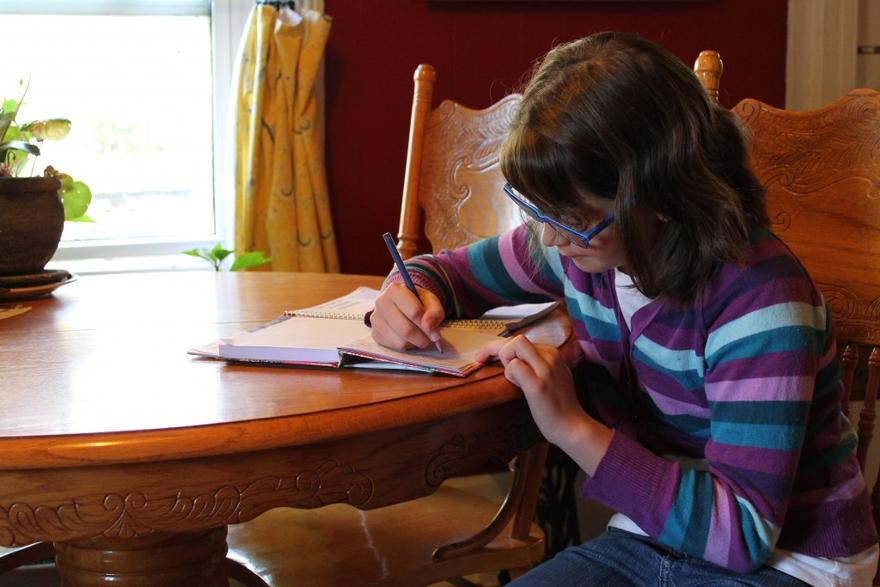I wish someone told me this when I was young.

This is Maeve. She's in Grade Four. Maeve has been doing my Daily Prompts almost every day. She's an inspiration for us all.
Last week I had the magical, glitter-and-petals-floating-in-the-air experience of having Francesca Lia Block give a Master Class to The Story Intensive students. I read her first book, Weetzie Bat, when I was in high school.
I knew I wanted to be a writer even then, but I had no one to talk to about it. My guidance counsellor thought I should eventually get a job in communications, which sounded reasonable. But I wanted to write books!
I wrote Francesca Lia Block a letter, asking for advice, and sent it to her publisher. She wrote me back. That connection -- being seen as a writer even though I was just a teenager -- completely changed the course of my life. There are a lot of young writers who read my newsletters.
Maybe you know one of them.
Maybe YOU are a young writer! If so — today's post is for you. I see you.
Nicole Baute has worked with writers of all ages. I teach adults -- I've never had a class of young writers before. So I asked her if there was any advice that she'd want to give a young person who is at the very start of the writing life.
She answered. Read on.
xo,

What I Wished I’d Known Before Setting Out to Become a Writer
My childhood was steeped in story: I grew up on a farm, where I spent my spare time reading books in bed, scribbling in my journal, and directing plays and movies starring--wait for it--ME, with my siblings and cousins in supporting roles (sorry, guys).
And although writing had long been my greatest passion,it took me a while to realize it might be possible to make it my real-life job.
Here’s what I remember. I was a teenager, sitting in the backyard under the peach and apple trees planted by my grandparents, flipping through a guide of some sort—perhaps a university guide, I can’t quite recall. And I suddenly realized someone wrote all of the text I was reading. Before then, I’d fantasized about writing the features in my mom’s Canadian Living magazines, or becoming the next Judy Blume or R.L. Stine, but those dreams always seemed out of reach, somehow. That was the day I realized there were jobs for writers beyond the obvious: I could find a way to write for a living, surely.
I wasn’t exactly dreaming big, but I had no idea how big to dream. I’d never met a writer before.
In my hometown, adults were farmers, teachers and factory workers. I knew doctors, dentists, a lawyer, and some people who, to my mind, simply worked in “business.” But nary a writer in sight.
This was about 15 years ago. The Internet existed, but it was slow as molasses and nobody knew how to use it. My parents did everything they could to help me, but mostly I was on my own to figure it out.
I now work as a writing coach for small-business owners while writing fiction on the side. I love my writing life, but I took a somewhat circuitous route here, with plenty of detours and pit stops. (With lovely views, mind you!) When I look back, there are a few things I wish someone had told me (if they only could have found me out there, under the peach and apple trees).
I know Sarah and I are both really passionate about supporting young writers, so I’m thrilled for the chance to share this advice with you all. If you’re a young person with a writerly twinkle in your eye—or if you know someone who is—I really think these suggestions can make a difference. Onward!
1. Experiment with all different kinds of writing (and reading!) until you figure out what feels best.
Write a feature story for your campus newspaper. Try poetry. Volunteer to write the newsletter for your favourite club or not-for-profit organization. Take a screenwriting class. Try it all, but keep in mind that you’re experimenting—that is a luxury that becomes more difficult as you get older (sad but true). Which projects thrill you? Which stress you out? What are you really great at? Pay attention, you’ll need this information for later.
And while you write, don’t forget to read. Read everything, but notice what you gravitate towards naturally. As Sarah always says—and it’s one of the best pieces of advice on writing I know—write what you want to read. Follow that joy.
2. There are MANY ways to make a living as a writer, if that's what you decide to do—and more to be created.
Although the traditional media industry might be shrinking, new writing-related jobs are created everyday. I know people who get paid to write social-media updates, technology manuals, website copy, newspaper articles, government reports, magazine features, and countless stories for websites owned by companies and not-for-profit organizations. Writing skills are indispensible in our Internet era. Most of the small-business owners I work with come to me because they’ve realized strong, clear writing is essential for their success. If you can write well, you can find a way to be paid for it—if you want to be.
3. However, it’s more than okay to be a writer and have an unrelated day job—but don’t expect to get that advice from your guidance counsellor.
For those of us who were raised to believe our identity (and self-worth) is intrinsically tied to our job titles and what we do to pay the rent, this advice is completely counter-intuitive. But the writing that lights you up may not be particularly lucrative (hello, fiction?), especially not in the beginning. That’s okay. It doesn’t necessarily have to be.
I also know writers who work in communications, as therapists, in information technology (!), and as hospital clerks, receptionists, baristas and teachers. Some of these jobs are intended to be temporary, but others are career paths in their own right. There’s nothing wrong with having two jobs: one that pays the bills and the other that feeds your soul (although, of course, it helps to like your day job). In fact, you might learn to love the balance.
You might find that your day job and the characters you encounter in it inspire you to write. And when you get stuck with your writing, as you will from time to time, you’ll probably appreciate having another identity and community to lean on. This will make writing safer for you, which will help you keep going.
4. Surround yourself with like-minded people. Repeat.
Living by your own set of values, goals and expectations isn’t always easy. There will be times when you get frustrated, or feel alone or misunderstood. That’s why it’s so essential that you make friends with other writers and creative people. More than anything, you need peers who understand what you’re trying to do, and can cheer you on through the highs and lows, because you will have both.
You might meet these people in school, especially if you decide to study creative writing or journalism, or in professional circles, at writing workshops that you take in your spare time, online, or at local events. You’ll know a kindred spirit when you encounter one: don’t let them go without a coffee or Skype date, at least!
When I start to wonder why I insist on torturing myself by trying to run a business and write short stories on the side, or when the joy I usually feel for fiction momentarily fades, I chat about it with my partner (a journalist and occasional creative writer) or call my writing friend Tom. I’m not looking for a pep talk or tough love. I just want to feel understood, and I always do.
5. Encourage and support your writing friends—you aren't actually competing with them.
I’ll be honest: as I took my first steps into the writing world in my late teens and early 20s, I felt slightly threatened by my few friends and peers doing the same. What I didn’t realize is that I wasn’t competing with any of them—and never would be—and that finding ways to encourage each other would have been infinitely more helpful than secretly pouting over so-and-so’s column in the campus newspaper.
You’re the only person in the world who can write what you do. Even if you and a friend appear to have similar interests and goals, your writing is yours only, and there is more than enough space in the world for the both of you. Writing might be a solitary act, but you can’t do it entirely alone—I don’t think you can, anyway. Build a kind, supportive network and your life and your writing will be healthier and happier for it.
I hope you find these suggestions helpful, and that they inspire you to build a life and career you love. But I must add that there’s one piece of advice more important than anything on this list:
Write. Just write. Do it often. Do it every day if you can.
That’s the only real way to become a writer. The other pieces will fall into place eventually, as long as you keep going.
 Nicole Baute has spent her entire life telling stories, both professionally and in her spare time as a creative writer. She has a Master's degree in Journalism and was once a reporter at Canada's largest daily newspaper. She’s also co-edited a collection of women's writing called EAT IT, and spent time as a media trainer at a university in Ghana, West Africa. As a writing coach, she helps small-business owners become more confident writers and develop storytelling skills that take the pain out of marketing.
Nicole Baute has spent her entire life telling stories, both professionally and in her spare time as a creative writer. She has a Master's degree in Journalism and was once a reporter at Canada's largest daily newspaper. She’s also co-edited a collection of women's writing called EAT IT, and spent time as a media trainer at a university in Ghana, West Africa. As a writing coach, she helps small-business owners become more confident writers and develop storytelling skills that take the pain out of marketing.

3 comments
Leave a comment